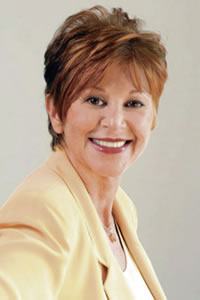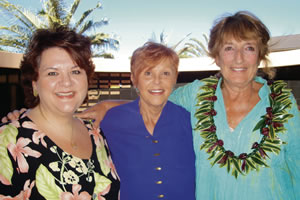A New Way To Deal With Caregiving

Sheila Warnock: ‘Put your oxygen mask on first, then take care of your loved one’. Photo from Sheila Warnock
Kaua’i Hospice invites an author to speak on ‘Share the Care,’ which offers a different model for those who find themselves caregivers
Tending to someone who is terminally ill can take an emotional toll on the caregiver. It’s an issue Sheila Warnock, author and founder of Share the Care, is personally familiar with and it is the reason she visited Kaua’i last month.
The New York City resident was invited by one of the original founders of Kaua’i Hospice, Deborah Duda, and Kaua’i Hospice executive director Lori Miller to discuss options caregivers have for help.
“Put your oxygen mask on first, then take care of your loved one,” says Warnock, paraphrasing flight attendants’ instructions to parents flying with small children. “If you get sick, too, then everyone loses.”
The “oxygen mask,” she believes, lies within the community and her Share the Care model.
“Share the Care is about group work,” explains Warnock. “It takes care of not only the person in need, but the entire family.”
Finding help is easy, and anyone can form a group of willing caregivers.
“There are so many people out there who want to help, you just have to ask,” says Warnock.
While it is simple to convince friends or concerned citizens to lend a hand, the hardest people to convince will be the recipient and primary caregiver.
“When we take care of someone we want to think we’re superman or woman,” says Duda. “It’s hard to ask for help.”
But it’s necessary. “Sometime in our lives, we’re all going to be caregivers, and some of us already are,” adds Duda, a Kalaheo resident.
And without help, a caregiver’s well-being, as well as finances, could be drained, says Duda, who aided her mother who was afflicted with Parkinson’s disease.

(from left) Kaua‘i Hospice executive director Lori Miller, Sheila Warnock and Deborah Duda. Coco Zickos photo
Recruiting volunteers to pitch in even for a short period of time if the person’s illness is in a very advanced state is helpful for everyone involved.
“Even if it’s three weeks, they still get to feel that love,” says Warnock.
“Share the Care is a simple solution to a very complicated problem,” says Duda, who hopes to help initiate the program on Kaua’i.
Warnock, too, hopes to interest the general public in participating in Share the Care. She plans to return in early 2012 to begin professional training and establish stations where people can find trained individuals to provide information and coaching on the Share the Care model.
“We as a society can no longer depend on the government to fund caregiving programs,” says Warnock, who has won many accolades for her work, including CNN’s Hero of the Year.
“We need to take charge of our own caregiving needs. It is going to be up to us to take care of each other if we intend to make it during the coming years as the aging population doubles.”
There are approximately 77 million baby boomers approaching retirement, according to statistics Warnock presented to an audience of more than 50 people last month.
In addition, there are 66 million caregivers in the United States who do work valued at some $375 billion per year, yet they’re “not paid a cent,” says Warnock.
“Those figures are staggering,” she says.
Warnock’s philosophy for caregiving started in 1988 when she met with 12 others to support a mutual friend who was diagnosed with terminal cancer.
“Our group of 12 developed the forms, principles and systems that eventually became the basis for the book Share The Care,” she says.
“In teaching others what to do and how to do it using our forms and systems showed us that we needed to put the model down on paper so others did not have to reinvent the wheel.”
Not only did Warnock care for friends, but her mother as well.
“Caring for my mom was a profound healing for us both. She came to totally trust my decisions for her care. She lit up like a Christmas tree every time I came to see her,” she says.
She says she found tending to terminally ill friends throughout her life also very profound.
“I grew stronger from every effort,” says Warnock, adding that she’s made lasting friends with others in the Share the Care groups she formed.
It’s an experience she hopes the community will embrace.
“Your community is loaded with love, so I think it would do very well here,” says Warnock, who enjoys visiting new places like Kaua’i, especially coming from a “cement city.”
“The only thing that limits Share the Care is imagination,” says Warnock.
Visit sharethecare.org for more information.



